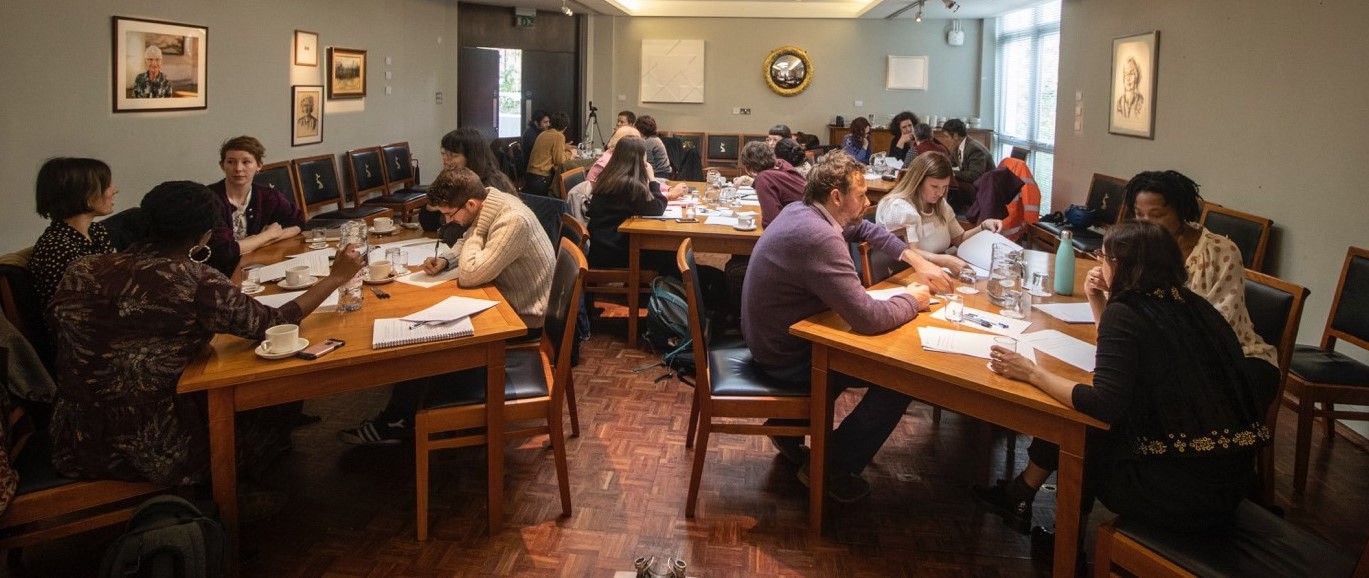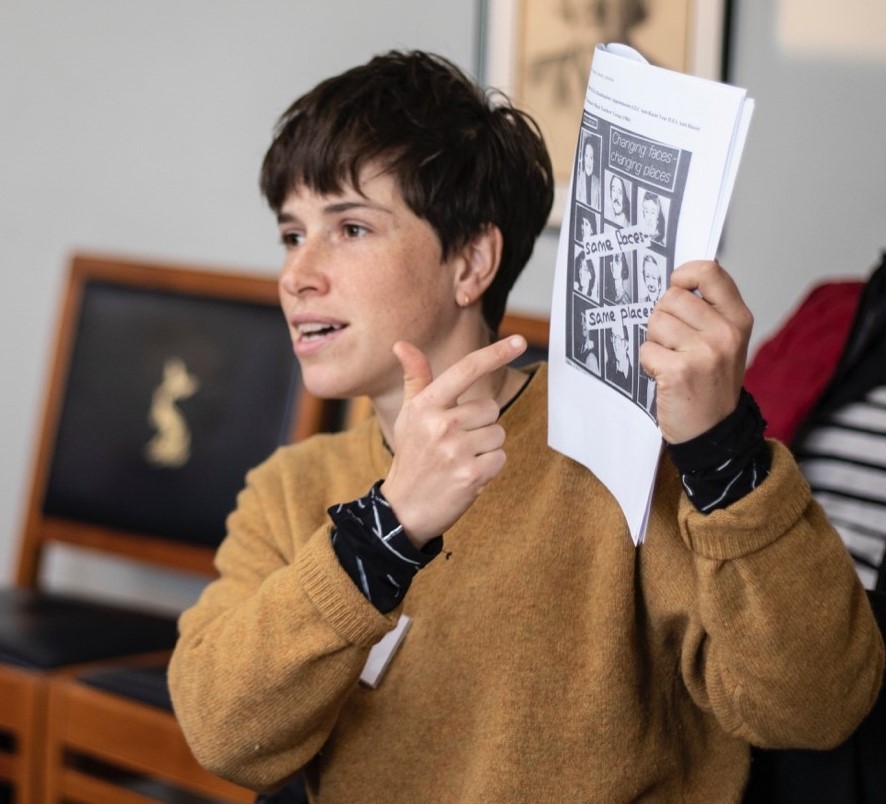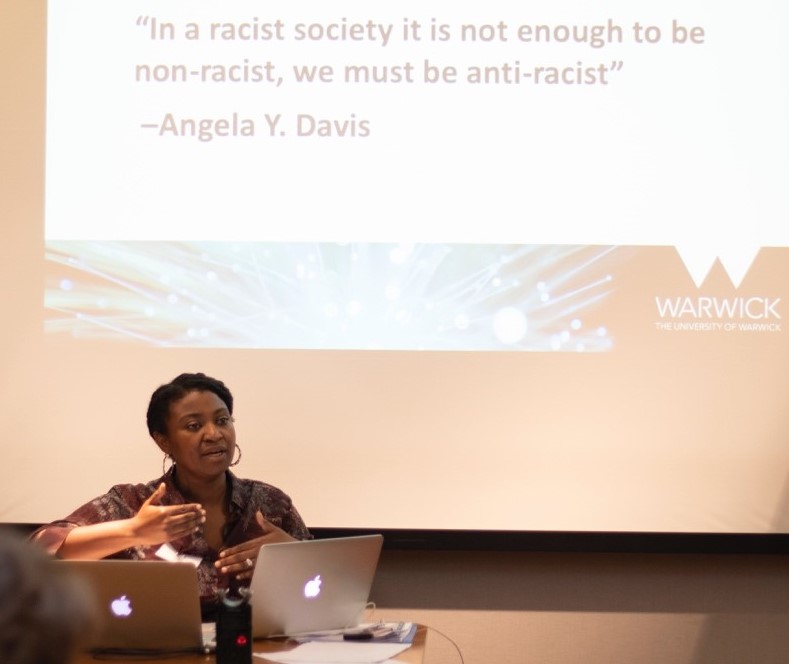Spotlight: Anti-Racist Education
Anti-racist education as an alternative to 'diversity and inclusion' at the University of Cambridge
How might an anti-racist agenda look different to the University’s current emphasis on diversity and inclusion? This question stood at the heart of a recent workshop for University teachers and policymakers in Cambridge, which was held at Murray Edwards College at the beginning of November and generously supported by the inaugural University Diversity Fund.
Organised by three postgraduate and early-career researchers based in the Faculties of Education and History, Anti-racist education: history, theory, practice explored the relationship between the history of anti-racist activism in British secondary schools, and the emergence of similar initiatives in contemporary higher education. It was held in response to recent calls that universities need to do more to address entrenched inequalities and discriminatory practices around race and ethnicity, by focusing less on diversity and more on anti-racist pedagogies. Attended by participants from across the University representing all career stages, the workshop considered how we all have a responsibility to create teaching, learning and research environments that support every student and colleague.
We began with an interactive session led by Laura Carter and Chris Jeppesen, which introduced participants to the history of anti-racist activism in London secondary schools during the 1970s and 80s. It drew on research from Laura’s and Chris’s current project, ‘Secondary education and social change in the UK since 1945’. Participants studied a range of sources produced by campaigners, pupils and critics of anti-racist pedagogy to see how debates unfolded in these decades. The primary sources used in this session are available on the SESC website.

The anti-racist movement grew rapidly in the 1970s as the British school system became more diverse, and was strongly linked to the emerging anti-sexist framework. While central and local government responses to the rising number of ‘immigrant pupils’ (the official categorisation for all pupils of colour until the mid-1970s) focused first on ‘assimilation’ and then integration through ‘multi-cultural education’ – which positioned racism as the product of individual intolerance which could be educated away – anti-racist campaigners criticised the inadequacy of these approaches in addressing the deep structural inequalities disproportionately affecting working-class pupils of colour.

They argued that a ‘multicultural’ approach only exacerbated the problems it claimed to address. The ‘multicultural’ project in British schools failed to deal with institutional racism, lacked any awareness of the relationships between racial, gendered, and classed discrimination, and offered no response to rising levels of racialized violence that followed the growth of National Front activity around schools. In its place, activists demanded a more assertive rejection of, and challenge to, racism in all its forms: to be anti-racist became a statement of active opposition as opposed to passive acquiescence.
Following on from this session, Sharon Walker explored the theoretical concepts that underpinned anti-racist activism in the 1980s and which remain central to debates surrounding Higher Education today. Drawing on the rich insights offered by scholars working in the fields of Critical Race Theory, educational sociology, and post-colonial studies, she discussed how a renewed focus on the concepts of encounter, re-framing, and transformation can provide fresh possibilities for the University to reconceptualise its engagement with decolonising debates moving forward.
Specifically, drawing on a recent paper by Professor Fazal Rivzi, Sharon talked about moving away from decolonisation discourses favouring a binary relationship between European and non-European epistemic traditions, rendering them homogenous and monolithic. Instead the discourse needs to be reframed to reflect a colonial encounter that saw an exchange of knowledge, albeit amidst asymmetries of power: this could lead to a new relational politics of decolonisation, revealing European knowledge as always challenged and changed by other knowledges. Such new engagements with decolonisation debates requires the University to draw on a wealth of available knowledge to make decolonisation a central concern rather than one which takes places on the periphery of University activities and via social media.
During the group discussions in both sessions, participants drew attention to the salient links between issues raised by earlier anti-racist movements in the UK and current actions on decolonising the academy: the need to broaden the Eurocentric focus of curricula; the need to provide greater opportunities to teachers of colour to enter the profession and progress to positions of seniority; and the necessity for a vigorous and coordinated challenge to all forms of racism, everyday and structural. But they also observed the need to guard against the risks that led to the fracturing of the anti-racist movement at the end of the 1980s. This partly came from a political backlash and reduction in the funding streams that had supported anti-racist initiatives. Importantly, however, this also reflected frustration among communities of colour that anti-racist initiatives had been co-opted to benefit institutional reputations at the expense of meaningful action on racial discrimination and the overturning of structural inequalities. An anti-racist agenda at the University of Cambridge must put action on structural change ahead of any perceived ‘PR’ benefits.

These themes were developed in the afternoon sessions, which shifted focus onto how current teachers and policymakers might incorporate a more explicitly anti-racist approach into their everyday work. Dr Meleisa Ono-George (University of Warwick) gave a thought-provoking and energising keynote address, which asked participants to think about not only what we teach, but how we teach. She outlined both the challenges and rewards of embedding an anti-racist philosophy into the heart of institutional ethos and how this is being done at the University of Warwick. Her insights highlight the need for coherence within institutions but also the need for collaboration between institutions in order to learn from each other.
The day concluded with a plenary discussion in which participants spoke about their experience teaching in Cambridge and the challenges faced. Many felt that a more proactive and coordinated approach is required, cutting across disciplinary boundaries and the constituent parts of the university, to build robust support for anti-racist and decolonising initiatives. We observed that the historical examples discussed earlier in the day served to warn of the dangers of complacency in the rapidly changing educational landscape, and this elicited some exasperation regarding a sense of history repeating itself, in the face of a lack of dialogue on these issues between British secondary and higher education over the past forty years. Shifting institutional priorities, changes in funding and admission structures, and lack of representativeness at a postgraduate level could all quickly undermine progress by further entrenching existing inequalities. Guarding against this requires a concerted and proactive effort at all levels of the University.
The organisers would like to thank again all participants and speakers for making this such an engaging and thought-provoking day, and the University Diversity Fund for its support. What became clear during the course of the workshop is that this is a conversation already well-advanced in various parts of the University, but not at all in others. Numerous events over the coming weeks showcase how much appetite there is amongst staff and students for a serious reappraisal of how the University engages with anti-racist approaches to teaching, learning and organisation. We look forward to being part of this going forward.
Authors
Sharon Walker, PhD researcher, Faculty of Education
Dr Laura Carter, Postdoctoral Research Associate, Faculty of History
Dr Chris Jeppesen, Postdoctoral Research Associate, Faculty of History
Photographer
Kalifa Damani, Faculty of Education
To read more about Dr Meleisa Ono-George's perspectives from the University of Warwick, see her article 'Beyond diversity: anti-racist pedagogy in British History departments', Women's History Review (2019).
To read more about Professor Fazal Rivzi's reflections on decolonisation, see Rivzi, F. (forthcoming) Decolonisation (lecture given at the University of Pretoria and Stellenboach University, South Africa).
Cambridge Teaching & Learning Newsletter vol. 1 (issue 2) November 2019
